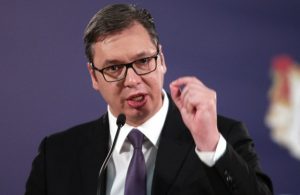
The Editor in Chief of Die Weltwoche Roger Köppel’s interview with Serbian President Vučić shows that neutrality requires steadfastness – and other non-aligned countries. “Weltwoche” is a progressive Swiss newspaper, published in German. See this the actual interview in German with English subtitles.
With this extraordinary interview on the 26th anniversary of NATO’s illegal bombing of Yugoslavia (March 24, 1999), Roger Köppel of Weltwoche, shows how important neutrality is for Switzerland. Yugoslavia was carved up into individual provinces, most of which have since become independent countries.
At that time, Yugoslavia was economically one of the most advanced and fastest growing countries in Europe. The people lived relatively contented lives under General Tito, who held the various ethnic groups together with an iron fist. This was not acceptable to the West because Yugoslavia was practicing a kind of socialism that was intolerable to the West. So, the country had to be torn apart, which today is called the Balkanization of Yugoslavia.
The end of Yugoslavia was prepared long in advance, for example, with increasing debt from the International Monetary Fund and the World Bank, so-called structural adjustment loans, which are not necessary in most cases but are accepted because otherwise a country risks being internationally marginalized.
Furthermore, Yugoslavia is in an ideal strategic location for NATO to establish a so-called Eastern control base. To this end, the USA, with Europe’s consent, separated the province of Kosovo from Serbia and made it an independent small country, with the NATO base Camp Bondsteel, the largest in Europe, which also serves as the headquarters for the NATO Kosovo Force (KFOR).
Although not a NATO member, Switzerland has been participating in KFOR with SWISSCOY [“Swiss Company” for NATO KFOR] troops since 1999.
After nine years of preparation, Kosovo unilaterally declared its independence from Serbia on February 17, 2008. The United States and Switzerland were the first countries to recognize Kosovo’s independence and immediately established diplomatic relations with the new country. And this even though Switzerland was well aware of the illegal NATO intervention in a sovereign country, and thus of the illegality of Kosovo.
Today, Kosovo is diplomatically recognized by about 100 countries (out of 193 UN members), but not by Russia and China, and of course not by Serbia nor by Bosnia-Herzegovina, which was also destroyed by NATO in August-September 1995, by the so-called “Operation Deliberate Force.”
Today, Serbia, the largest republic of the former Yugoslavia, is once again one of the most economically and sociologically advanced – and above all, most independent – countries in the Balkans. It has achieved its successes mainly under President Aleksandar Vučić. He opposes the dictates of Brussels and does not recognize the sanctions against Russia.
President Vučić was democratically elected in 2017 and re-elected in 2022. He initiated the “Open Balkans”, a free trade area within the Balkans, which triggered a kind of economic boom not only in Serbia but throughout the Balkans.
This independence does not suit Europe and the West. According to President Vucic, a “color revolution” is being organized and financed in Serbia, paid for mainly by European and US NGOs, which at the time were largely financed by the now-defunct USAID.
Listen to the interview (in English with German subtitles) where President Vučić presents his independent point of view.
This should also be a lesson for Switzerland to remain neutral, independent of the European Union and NATO.
*
Click the share button below to email/forward this article. Follow us on Instagram and X and subscribe to our Telegram Channel. Feel free to repost Global Research articles with proper attribution.
Peter Koenig is a geopolitical analyst and a former Senior Economist at the World Bank and the World Health Organization (WHO), where he worked for over 30 years around the world. He is the author of Implosion – An Economic Thriller about War, Environmental Destruction and Corporate Greed; and co-author of Cynthia McKinney’s book “When China Sneezes: From the Coronavirus Lockdown to the Global Politico-Economic Crisis” (Clarity Press – November 1, 2020).
Peter is a Research Associate of the Centre for Research on Globalization (CRG). He is also a non-resident Senior Fellow of the Chongyang Institute of Renmin University, Beijing.
Featured image: Protest on 22 December, at Slavija Square in Belgrade (Public Domain)
Global Research is a reader-funded media. We do not accept any funding from corporations or governments. Help us stay afloat. Click the image below to make a one-time or recurring donation.
Counter Information publish all articles following the Creative Commons rule creative commons. If you don't want your article to appear in this blog email me and I will remove it asap.





















No comments:
Post a Comment